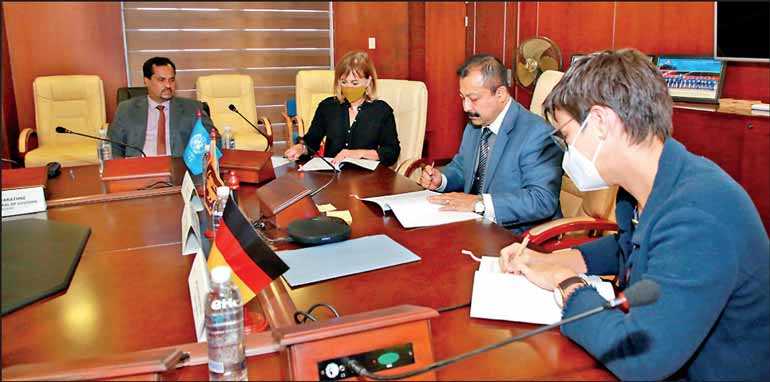Sunday Feb 22, 2026
Sunday Feb 22, 2026
Wednesday, 24 February 2021 00:00 - - {{hitsCtrl.values.hits}}

Sri Lanka Customs will work together with Deutsche Gesellschaft für Internationale Zusammenarbeit (GIZ) GmbH, United Nations Conference on Trade and Development (UNCTAD) and the private sector in the new project ‘Digitising Global Maritime Trade’ (DGMT).
The project is financed by the German Federal Ministry of Economic Cooperation and Development (BMZ).
SL is the second country to officially join the project after the General Department of Customs and Excise of Cambodia joined in October 2020.
In the DGMT project, public and private sector partners work together to improve customs’ digital access to advance sea cargo information. The project aims at implementing a new data integration solution called ASYHUB, which enables seamless exchange of sea cargo data between SL Customs and trade data providers involved in the maritime trading process.
SL Customs Director General retd. Major General Vijitha Ravipriya, GIZ SL Country Director Christiane Einfeldt and the United Nations Resident Coordinator in SL Hanaa Singer signed a Memorandum of Understanding (MoU) to formalise the cooperation on 11 February 2021 at the SL Customs Headquarters in Colombo.
“We are honoured that Sri Lanka was selected as a pilot for the implementation of this new technological solution. We expect that the implementation of the digital platform ASYHUB will enable speedy clearance of cargo, reduced transit time and ultimately minimise the trade costs for the private sector,” Major General Ravipriya said.
The data submitted will allow SL Customs to process the cargo prior to arrival and departure to determine earlier which cargoes to inspect and which to release, reducing the time and costs of maritime trade for importers and exporters.
“This project exemplifies Germany’s firm commitment to support rules-based, fair and free trade, particularly the implementation of the World Trade Organisation’s Trade Facilitation Agreement. The project’s outcomes will strengthen the framework conditions for trade and investment in Sri Lanka and make it an even more attractive market,” the Ambassador of the Federal Republic of Germany to SL Holger Seubert said.
GIZ SL Country Director Christiane Einfeldt emphasises that the collaboration between the public and private sector to improve accessibility to information via digitalisation will be beneficial for SL’s role in trade facilitation.
“By providing technical expertise and feedback during the implementation, the private sector stakeholders play an important role in ensuring an effective outcome. GIZ will support these new processes with targeted in-depth capacity building and awareness raising,” she said.
UNCTAD Director – Technology and Logistics Shamika Sirimanne points out the benefits to SL Customs from a streamlined risk management process: “ASYHUB will provide SL Customs with richer information to support a more informed risk assessment for a better targeting and more effective decision-making on which shipments to inspect. This means the project would increase the capacity of Customs to keep goods moving while reducing risks, which is especially relevant in the current COVID-19 pandemic.”